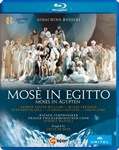|
Back
07/11/2018
Gioachino Rossini: Mosè in Egitto
Andrew Foster-Williams (Pharaoh), Mandy Fredrich (Amaltea), Sunnyboy Dladla (Osiride), Clarissa Costanzo (Elcia), Goran Juric (Mosè), Taylan Reinhard (Mambre), Matteo Macchioni (Aronne), Dara Savinova (Amenofi),
Prague Philharmonic Choir, Lukás Vasilek (chorus master), Vienna Symphony Orchestra, Enrique Mazzola (conductor), Lotte de Beer (director), Christof Hetzer (set and costume designer), Alex Brok (lighting designer), Felix Breisach (video director)
Live recording: Bregenz Festival, Bregenz, Austria (July 18 and 20, 2017) – 148’
C Major DVD 744808 (or Blu-ray 744904) – Notes in English, German, and French (Distributed by Naxos of America)

   
The main reasons to pay attention to this issue are 1.) It documents a rarely-performed opera that contains a good deal of terrific music; and 2.) The cast contains some fine singers giving committed performances under the skilled baton of Enrique Mazzola.
However, the tiresome production undercuts its virtues. Director Lotte de Beer has hired the three-member Dutch theatre company Hotel Modern to assist in the production. They have created films using tiny finger puppets that are projected at certain times enacting some of the action specified in the plot, notably toward the end when the Hebrews flee across the Red Sea. The three Hotel Modernists are also on stage throughout, arranging interactions among the performers and arranging tableaus as if the singers are mannequins in a museum display. It is hard to describe just how irritating this is.
The work (an azione tragico-seria) is often described as an oratorio (or “sacral tale”) telling of the exodus of the Israelites from Egypt and the preceding plagues as recounted in the Book of Exodus. In true operatic fashion there is also a fraught love story as the son of the Pharaoh, Osiride, is in love with a Elcia, a Hebrew girl. To complicate matters, the Pharaoh’s wife, Amaltea, has converted to Judaism. This all gives rise to various dramatic confrontations during which the singers seem to be doing their best despite the interventions of the three “arrangers.” At the end there are a few rude noises for the production team and there really ought to have been more.
What should be the dramatic climax is in Act III when the famous prayer (later used - and encored - at Rossini’s interment in Santa Croce in Florence) results in the parting of the Red Sea. The stage picture is given over to a film of the primitive little finger puppets floating around in water while the invisible chorus sounds sadly sub-par. The visual reference seems to be to contemporary boat people. This amounts to a worthy cause becoming the excuse for a feeble stab at relevance.
The ensuing film of a giant wave is but a paltry shadow of the effects in DeMille’s 1956 epic The Ten Commandments. Of course the film might have had more impact in the theatre (after all, on the Blu-ray one is seeing a film of a film). Apparently the wave aroused laughter at the work’s 1818 premiere; at least that didn’t happen here.
The production was seen at the 2017 Bregenz Festival, not on the huge outdoor stage on Lake Constance (the Bodensee to the locals - and how would they have parted the waves there anyway?) but at a smaller indoor venue (not named). It has since been presented in Cologne.
The vocal music overall avoids the bouncy embellishments we know from Rossini’s comic operas; the stress on cantabile technique gives a more solemn, dignified effect. Full marks must go to lead singers Goran Juric (bass) as Mosè, Sunnyboy Dladla (tenor) as Osiride, and Clarissa Costanzo (soprano) as Elcia, a role originated by Isabella Colbran - thus it has a mezzo-soprano tinge to it. Andrew Foster-Williams (baritone) makes a good effort as the Pharaoh but in the end is less convincing. There are two other tenor roles: Matteo Macchioni displays a bright, pinging voice as Aronne (Aaron), and Taylan Reinhard makes a vivid impression as the epicene Egyptian priest, Mambre. Soprano Mandy Fredrich ably encompasses the role of the conflicted Amaltea as does mezzo-soprano Dara Savinova as Amenofi (Miriam), Moses’s sister.
This opera deserves a recording (with visuals) deserving of its ambitions. Unfortunately this is not it.
Michael Johnson
|